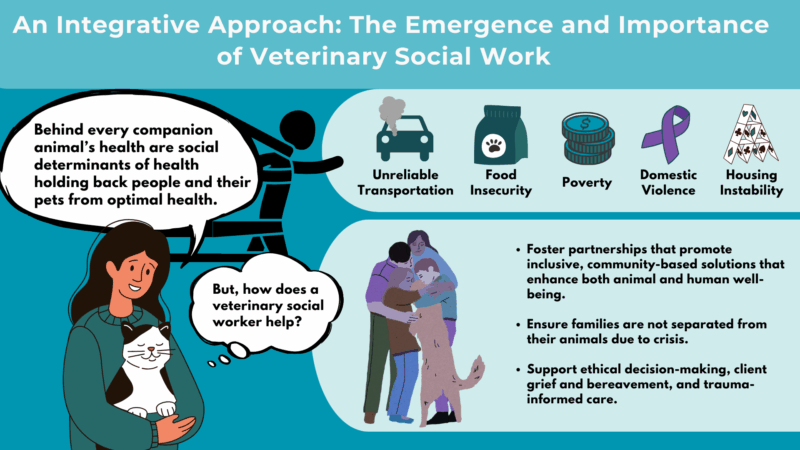
Written by Dr. Sarah Jane Lokaisingh
When people think of visiting the vet, their minds naturally turn to the health and well-being of the animal – but is that the whole story?
Beneath the surface of every veterinary visit lies a quiet tangle of human emotion. Behind every companion animal’s health lies a team of individuals navigating their own mental, emotional, and financial challenges, carrying burdens that are not always recognized or addressed. Veterinary social work recognizes this profound connection and highlights the interdependence of human and animal health. It combines the principles of social work with veterinary medicine to address the many challenges that pet owners and veterinary teams face. From helping families navigate the grief of a pet’s illness or death, to assisting those in underserved communities access affordable care, veterinary social workers play a crucial role in improving the lives of both humans and animals. They also provide a lifeline to veterinary professionals, who often carry the invisible weight of compassion fatigue and moral distress. By honoring the human experience within animal care, veterinary social work brings depth, empathy, and balance to the field, and strengthens the human-animal bond.
What does a career in veterinary social work truly entail? We are fortunate to have Dillon Dodson, an experienced veterinary social worker and the Director of Social Work at the Toronto Humane Society, offer insights and reflections on the field.
Can you explain your role as a veterinary social worker and how it fits within the broader framework of community veterinary medicine?
As a veterinary social worker—or a social worker embedded into veterinary or animal care work—my role bridges human and animal well-being by addressing the social, emotional, and systemic factors that impact access to care for both people and their companion animals. As the Director of Social Work at Toronto Humane Society, within the broader framework of community veterinary medicine, I work to mitigate barriers rooted in poverty, housing insecurity, violence, and mental health challenges, ensuring that families are not separated from their animals due to crisis. This role also involves supporting ethical decision-making, client grief and bereavement, trauma-informed care, and fostering partnerships that promote inclusive, community-based solutions. My work is grounded in the One Health approach, recognizing that human, animal, and environmental health are interconnected and must be addressed collectively.
Can you share some examples of how veterinary social work can help bridge gaps in healthcare for both pets and their owners?
Veterinary social work helps bridge gaps in care by recognizing that the health of people and animals is intertwined. For instance, animals can be health-promoting—encouraging routine, emotional regulation, and social connection—and pet guardians may make significant health-related decisions in the interest of their animal. I’ve worked with individuals who reduced or quit smoking, addressed obesity, or sought health support simply because they wanted to ensure they would live longer healthier lives with their pets. Social workers also play a role in preventing the spread of zoonotic disease through education and partnership, especially in communities where barriers to both human and veterinary health services exist. Programs such as pop-up clinics that provide veterinary medicine, plus behaviour support, plus social work co-located within human service spaces, or temporary foster care during hospitalization or recovery, ensure whole-family care while minimizing systemic gaps.
How do veterinary social workers collaborate with veterinarians, shelters, and other social service agencies to support both animals and their owners?
Social workers collaborate across disciplines to ensure animal and human well-being are addressed as part of a shared ecosystem. Animal well-being and human well-being are inextricably linked, and by bringing together veterinarians, shelter staff, social workers, housing advocates, and health care providers for example, we ensure these industries are not siloed. Instead, the professions are equipped to consider the full family dynamic. For example, in situations involving gender-based violence or hospitalization, I may work with both animal welfare and human services to co-create safety plans that include the pet. In cases of non-accidental injury to animals, I collaborate with child welfare or adult protective services to support broader safety planning. These interdisciplinary partnerships allow us to provide coordinated, compassionate care that reflects the full reality of people’s lives—including their bonds with animals.
What advice would you give to someone who is interested in pursuing a career in veterinary social work?
Veterinary social work is rooted in social work principles, values, ethics, and legislation. For those interested in this path, it’s essential to first gain foundational education and training as a clinician or practitioner—perhaps with specializations in mental health, health, ecojustice or community practice. This clinical grounding provides the critical opportunity to develop and hone your therapeutic, ethical, and systemic skills before venturing into nontraditional or emerging fields such as veterinary social work. Additional training in grief and bereavement or systems advocacy may be helpful, as is cultivating an understanding a basic awareness of animal behaviour, animal related laws, and human-animal relationships. Most importantly, remain connected to the core values of social work – inherent belief in dignity and worth, pursuit of social justice, integrity and competency in practice, anti-oppression, equity focused, and holistic care—while building interdisciplinary relationships that reflect the realities of our shared lives with animals. This work is as much about social justice and access to care as it is about compassion for animals. I also encourage engagement with professional networks such as the International Association of Veterinary Social Work (IAVSW)—where I currently serve as Vice President—to stay informed and connected in this growing field.
